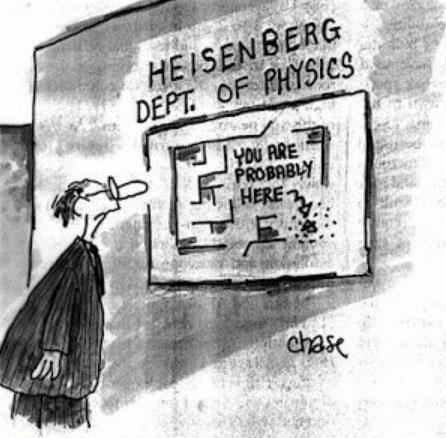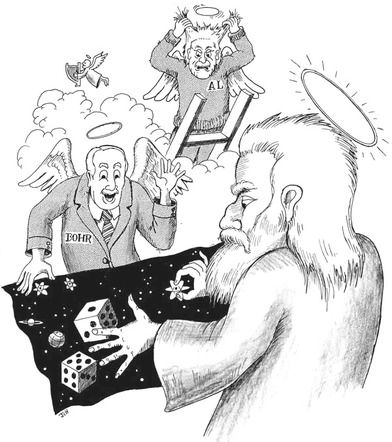The Death of Certainty -- The Birth of Quantum Mechanics
- particleexperience
- Jul 16, 2019
- 3 min read
Updated: Jul 19, 2019
Then came Quantum Mechanics.
For more than one hundred years physicists studied the following problem:
1) Given the present position and momentum of the constituents of some system acted upon by a known external force, determine the position and momentum of the system for all later times.
The branch of the field concerned with this problem is now referred to as Classical Mechanics. Classical Mechanics was nice and deterministic, like Mr. Laplace said. If we knew everything there was to know about a system at any time, we knew everything there was to know about the system at every time.
In the early 20th century, however, physicists began to delve more deeply into problems involving smaller and smaller length scales. Slowly but surely, they came to realize that the neat, all-encompassing framework they had designed for mapping out the orbits of the planets and understanding systems on the scale of human experience no longer applied when the primary objects for analysis were atoms and subatomic particles. This gave way to nexus of an entirely new field of study which we now refer to as Quantum Mechanics.
As I mentioned above, the crown jewel of Classical Physics was its ability to make essentially perfect predictions about the future of a system provided enough information about its initial state. In Quantum Mechanics this is not so. On some level, the statement: If we know everything there is to know about at system at any time, we know everything there is to know about the system at every time is still true in Quantum Mechanics, the problem is we can never know everything there is to know about any Quantum system at any time due to what is called Quantum Uncertainty.
Heisenberg’s famous uncertainty principle states that it is not possible for a particle to have a precise position, and a precise momentum at the same time. What this means in plain English is that we cannot possibly know where a particle is and where it is going at the same time.

So… game over then, right? If we can’t know where a particle is and where it’s going how could we ever answer the question (1)?
Well, not exactly. While it is true that the question (1) is, for all intents and purposes, intractable in Quantum Mechanics, we can adjust it into a form that is. In particular, while we can no longer predict, with absolute certainty, the path that a particle will take, we can predict the probability that a particle will go from one place to another. Hence our new question becomes:
2) Given the present distribution of positions and momentums which the system could have, determine the probability that the system will move from its present state, I, to some final state F.
It is important to note that Quantum Mechanics, as a theory, is “truer” than Classical Mechanics. Classical systems are necessarily composed of fundamental particles which can only accurately be described Quantum Mechanically. Hence, to completely understand even a Classical system we would really have to apply Quantum Mechanical analysis to all its fundamental parts. With that being said, Classical systems are very large. For this reason, we can understand their macroscopic properties by effectively averaging over the randomness produced by Quantum effects. As such, the results of Classical Mechanics remain accurate enough to solve almost any problem on the scale of human experience.

You are probably familiar with the concept of probability from your experience playing so-called “games of chance”. For example, consider the popular casino game, roulette. A typical roulette wheel consists of 37 equally sized slots. We can then say that the probability the roulette ball will fall in any single slot (assuming the game is not rigged in any way!) is 1 in 37, or roughly 2.7 percent. The various other possible bets in the game arise out of changing the player’s win conditions by adopting less strict qualifiers than landing on a single spot. For instance, a player might bet that the ball will land in a red slot, which would have a probability of 18/37, or about 49 percent.
Needless to say, the advent of Quantum Mechanics constitutes an extreme paradigm shift in the way Physicists do and think about the universe. For such a long time the triumph of Physics was that it could, essentially, predict the future.

Suddenly, the fact that nature is “inherently random” put a big fork in this triumph. Many Physicists refused to believe this was the truth, on principle. Perhaps most famously, Albert Einstein wrote, “God does not play dice.”


These rentals offer an unmatched level of detail and professionalism. Every table arrives clean and ready for instant fun, making roulette wheel rental them the ultimate choice for anyone looking to host a casino-themed party or social event that wows.
Their recommendations provide balanced pacing, smart timing, and access options that make every outing feel more vip table booking in las vegas manageable. With friendly support and practical knowledge, they help guests enjoy busy atmospheres without feeling overwhelmed by the crowd.
The concept of micropayment truly supports creators and users alike. It allows fair compensation for 소액결제 small services while giving users affordable access to premium content.
With exceptional resolution and depth, the strong 8k iptv enhances every pixel to perfection. Its advanced sensor and intelligent processing bring cinematic brilliance, making it perfect for creators seeking high-end quality in visual storytelling or professional-grade productions.